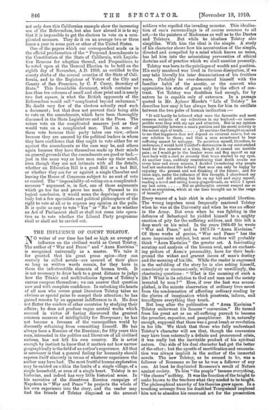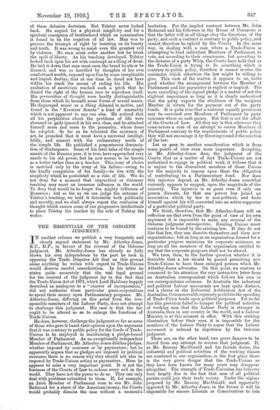THE INFLUENCE OF COUNT TOLSTOY.
NO writer of our time has had so high an average of influence on the civilised world as Count Tolstoy. The author of " War and Peace " and " Anna Karenina " is recognised universally as a master. We take it for granted that his great prose epics—they can scarcely be called novels—are assured of their place so long as written words remain, for they have in them the indestructible elements of human truth. It is not necessary to draw back to a great distance to judge how the Titanic and multitudinous figures of Tolstoy's canvas compose themselves ; we can answer that question now and with complete confidence. In unlocking the hearts of all men who revere great literature Tolstoy takes no obvious or special pains to compel their attention; he has gained renown by an apparent indifference to it. He does not flatter the readers of other countries by studying their affairs ; he does not produce vague neutral works which succeed in virtue of having discovered the greatest common measure of intelligibility for Europeans ; he has not become a freeman of the cosmopolitan world by discreetly refraining from committing himself. He has always been a Russian of the Russians ; for fifty years this man, interested in the politics and literature of all civilised nations, has not left his own country. He is artist enough by instinct to know that it matters not how narrow geographically is the field of an author's experience. All that is necessary is that a general feeling for humanity should express itself sincerely in terms of whatever experience the author may have had. The most fruitful human exploration may be carried on within the limits of a single village, of a single household, or even of a single heart. Tolstoy is no historian, and indeed has very little historical sense. In his narrative of the disastrous Russian campaign of Napoleon in " War and Peace " he projects the whole of his own experience into the story, and the reader may find the friends of Tolstoy disguised as the peasant soldiers who repelled the invading monster. This idealisa- tion of one's surroundings is of course common to all art,—to the painters of Madonnas as well as to the Dantes and Tolstoys. But while he idealisea Tolstoy also simplifies. With him the ideal is the simple. A study of his character shows how his accentuation of the simple, directed and compelled by a mind which knows no mean, has led him into the astonishing perversities of ethical doctrine and of practice which we shall mention presently.
Tolstoy was born to the privileges of wealth and position. His early manhood was lived in furious dissipation, if we may take literally his later denunciations of his fruitless years. Probably he over-denounced himself with the familiar habit of the ascetic, or the convert who appreciates his state of grace only by the effect of con- trast. Yet Tolstoy was doubtless bad enough, for by nature he is capable only of extremes. In a passage quoted in Mr. Aylmer Maude's " Life of Tolstoy " he describes how easy it has always been for him to oscillate between the two poles of human inclination :— "It will hardly be believed what were the favourite and most common subjects of my reflections in my boyhood—so incom- patible were they with my age and situation. But in my opinion incompatibility between a man's position and his moral activity is the surest sign of truth. At one time the thought occurred to me that happiness does not depend on external causes, but on our relation to them ; and that a man accustomed to bear suffering cannot be unhappy. To accustom myself, therefore, to endurance, I would hold Tatishef's dictionaries in my outstretched hand for five minutes at a time, though it caused me terrible pain ; or I would go to the lumber room and flog myself on my bare back with a cord so severely that tears started to my eyes. At another time, suddenly remembering that death awaits me every hour and every minute, I decided (wondering why people had not understood this before) that man can only be happy by enjoying the present and not thinking of the future ; and for three days, under the influence of this thought, I abandoned my lessons, and did nothing but lie on my bed and enjoy myself, reading a novel and eating honey-gingerbreads, on which I spent my last coins. But no philosophic current swayed me so much as scepticism, which at one time brought me to the verge of insanity."
Every wearer of a hair shirt is also a potential libertine. The wrong impulses most frequently mastered Tolstoy when he was at the University and when he was an officer in the Army. But even when he was fighting in the defences of Sebastopol he yielded himself to a mighty emotion of pity for the suffering soldiers, and this left a deep mark on his mind. In the years 1864-69 he wrote " War and Peace," and in 1873-76 "Anna Karenina." Of these works of genius, " War and Peace " has the more impressive subject, but most readers will probably think " Anna Karenina," the greater art. A fascinating scrutiny and analysis of the human soul, and an enchant- ing picture of Anna's personality, have for their back- ground the widest and gravest issues of man's destiny and the meaning of his life. While the reader is engrossed in the unfolding of the story he is also asking himself, consciously or unconsciously, willingly or unwillingly, the chastening questions : " What is the meaning of such a life ? What is its relation to God and man and the society invented by man P " Here, if ever the feat was accom- plished, is the minute observation of ordinary lives saved from the condemnation of affording ordinary reading by the glories of imagination which penetrate, inform, and transfigure everything they touch. Not long after the publication of " Anna Karenina " Tolstoy underwent his famous " conversion." He turned from his great art as an all-sufficing pursuit to become the preacher, expositor, and pamphleteer. It is, naturally enough, supposed that there was a great break or revolution in his life. We think that those who fully understand Tolstoy's character will see that, though the conversion may have been externally a definite and pronounced crisis, it was really but the inevitable product of his spiritual nature. One side of his dual character had got the better of the other ; but the apostle of mortification and renuncia- tion was always implicit in the author of the immortal novels. The new Tolstoy, as he seemed to be, was a follower of Rousseau so -far as he was a follower of any one. At least he duplicated Rousseau's revolt of Nature against society. To him "the people" became everything, "the classes" nothing. It was the function of the taught to make known to the teachers what they needed to be taught. The philosophical anarchy of his theories grew apace. In a touching message from his deathbed Tourguenief implored him not to abandon his renowned art for the prosecution of these delusive doctrines. But Tolstoy never looked back. He argued for a physical simplicity and for a spiritual conception of brotherhood which on examination is found to be the negation of all law. Man was to procure the triumph of right by insisting on its beauty and truth. It was wrong to resist even the greatest evil by violence. No man must order another lest he break the spell of liberty. As his teaching developed, Tolstoy looked back upon his art with contempt as a thing of dross. He laid it down that man must earn the bread he ate or be damned, and was so horrified by thoughts of his own comfort and wealth, imposed upon him by some inexplicable and impish destiny, that at one time he dared. not have within his reach the means of ending his life. His exaltation of asceticism reached such a pitch that he denied the right of the human race to reproduce itself. His perversities of thought were hardly distinguishable from those which lie beneath some forms of sexual mania. He disparaged music as a thing debased in motive, and found in the " Kreutzer Sonata" a kind of sensuality which is not apparent to any one else. He noticed that all his perplexities about the problems of life were shunned or gaily ignored in his own class, and he attached himself more and more to the peasantry, whose dress he adopted. So far as he tolerated the existence of art, he preached that it must have a universal intelligi- bility, and consort with the rudimentary needs of the simple life. He published a preposterous denuncia- tion of Shakespeare. Some of his later tales of the simple annals of the Russian poor, it is true, have approached very nearly to his old power, but he now scorns to be known as a writer rather than as a teacher. This irony of choice is matched only by the irony of his failure—owing to the kindly compulsion of his family—to live with the simplicity which he postulated as a rule of life. We do not deny for a moment that unpractical or visionary teaching may exert an immense influence in the world. To deny that would be to forget the mighty influence of Rousseau ; but so far as we can judge the outcome of Tolstoy's teaching, we hold it detestable both politically and morally, and we shall always regret the confusion of thought which causes some of our progressive intellectuals to place Tolstoy the teacher by the side of Tolstoy the writer.



































































 Previous page
Previous page